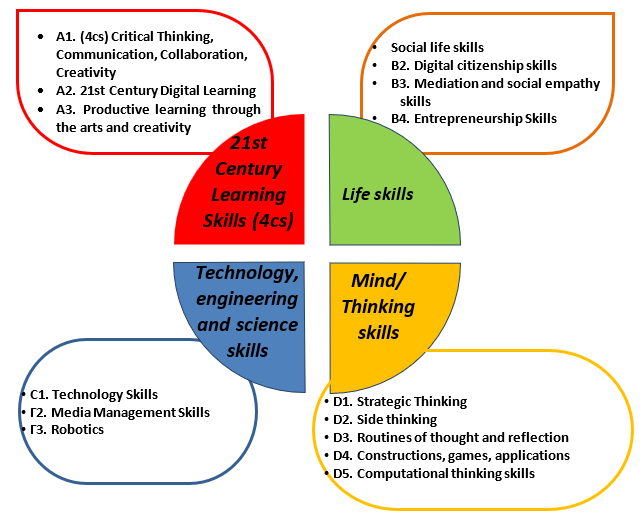Formal education and training must provide citizens with a wide range of skills that pave the way for personal integration and growth, social inclusion, active citizenship and employment. These include, in addition to basic reading and writing skills, science and foreign languages, and transversal skills and basic competencies such as digital skills, critical thinking, problem solving and learning skills.
These skills must be enhanced throughout lifetime for citizens to be enable to adapt to changes in the workplace and society, as well as to cope with the complexity and uncertainty of the modern world.
In Skills Lab, targeted skills are grouped and cultivated into four (4) cycles as follows:
A’ Cycle: 21st Century skills (4cs)
A1. 21st Century Learning Skills (4cs) (Critical Thinking, Communication, Collaboration, Creativity)
A2. 21st Century Digital Learning (4cs in Digital Environment) (Digital Communication, Digital Collaboration, Digital Creativity, Digital Critical Thinking, Combined Digital Technology, Communication and Collaboration Skills)
A3. Productive learning through the arts and creativity
B’ Cycle: Life skills
B1. Social life skills (Self-care, Social skills, Empathy and Sensitivity, Citizenship, Adaptability, Durability, Responsibility)
B2. Digital citizenship skills (e-Government, Digital citizenship, Safe internet browsing, Technology addiction protection, resilience)
B3. Mediation and social empathy skills (Empathy and Sensitivity, Mediation, Conflict Resolution, Citizenship)
B4. Entrepreneurship Skills (Initiative, Organizational Capacity, Planning, Productivity, Efficiency)
C’ Cycle: Technology, engineering and science skills
C1. Technology Skills (Skills of creating and sharing digital creations, Skills of analysis and production of content in print and electronic media, Skills of interdisciplinary and interdisciplinary use of new technologies)
C2. Media Management Skills (Computer Literacy, Digital Literacy, Technology Literacy, Media Literacy, Internet Security)
C3. Robotics (Modeling and Simulation Skills, Scientific / Computational Thinking)
D’ Cycle: Mind/Thinking skills
D1. Strategic Thinking (Organizational Thinking, Case Study and Problem Solving)
D2. Side thinking (Creative, productive, holistic thinking)
D3. Routines of thought and reflection
D4. Constructions, games, applications
D5. Computational thinking skills (Scientific / computational thinking mediation)





